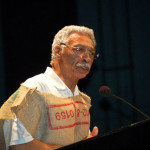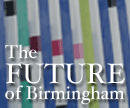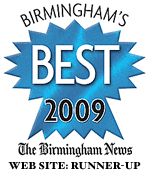Books: Excerpt from Carrie Rollwagen’s ‘The Localist’
By Wade Kwon
Photo: Cary Norton
The following chapter is an excerpt from Birmingham author Carrie Rollwagen’s new book, “The Localist” [aff. link]. She is co-owner of Church Street Coffee and Books, a copywriter and fellow blogger. I featured my friend Carrie in my first book, “The Social Media Stars of Birmingham.”
She discusses the new economic reality, the power of corporations and the importance of shopping locally.
• • •
Neon Jelly Bracelets, Big Hair and the American Dream
I’m a child of the ’80s, and as a kid, I really bought into everything the decade stood for: the commercialism and capitalism and neon, but also this crystallization of the American Dream, this sense that things could keep getting better and people would keep getting richer, and the only thing I had to do to be part of that success was to keep striving and fighting and working hard.
I started giving up on unlimited financial success a few years ago for religious reasons (Jesus would’ve made a terrible stockbroker), but anyone who didn’t have that same epiphany was forced out of their Reagan goggles anyway when our national — and global — economy collapsed. We haven’t hit Depression and Dust Bowl levels of poverty, but we aren’t doing so great either. Lots of people lost their jobs and couldn’t find new ones. Lots of people had to downsize and give up their houses and cars and dreams when their credit collapsed. Lots of people worked really hard and gave their bootstraps a really good tug and landed on the wrong side of a welfare line anyway.
News outlets love to broadcast about the financial meltdown, and bloggers like to write about how they’re affected by it. Every generation seems to think it’s got the best claim on being the worst treated by the economic collapse: The Greatest Generation saw its pensions and investments disappear. Baby boomers expect to lose social security and say goodbye to early retirement. Generations X and Y can’t advance in our jobs and don’t know what to do if we lose them. And Millennials grew up expecting financial security that may never materialize. We all have valid reasons for feeling tricked. But maybe it’s time we stopped feeling sorry for ourselves.
The financial collapse wasn’t something most of us, regardless of generation, expected. But maybe we should have. Economic systems naturally rise and fall, and it’s never wise to think their positive momentum will continue forever. For some reason, we all ignored that, and we set up our lives as if we’d only get more prosperous and hard times would never come and we’d become progressively richer and happier forever. We were living our lives like we were in an ’80s music video, where the music was loud and the hair was big and the bad times would be as short as the skirts. It’s a lot of fun to think that way. It’s why I liked to think that way as a little kid.
But maybe it’s time we grow up. Maybe we should admit to ourselves that life is full of ups and downs and to start looking at prosperity, at least partially, as a chance to save up for hard times ahead. We’ve been trained to think growing up is the worst thing of all, but I’m thinking maybe it isn’t. Acting like an adult can suck, but it can also be really exciting and freeing. It can also help us mature into people that we like being, developing personalities and economies that grow out of our choices instead of the choices that are made for us. Being less naïve and selfish with our finances and, instead, opening our eyes for the good of our community, and even our country, might just make our lives better, safer, and more of a stable place to land. Is creating that kind of world, that kind of economy, a lot of responsibility? Sure. But it could also be pretty incredible.
The things we dreamt about in the ’80s aren’t necessarily naïve or unreasonable (okay, maybe flying cars were). In general, it’s okay to want prosperity for our country. It’s okay to hope our government can provide for things like building interstates and defending us in a war. It’s understandable to want good, safe neighborhoods for our kids to grow up in. And it’s okay to be patriotic, to want a strong nation. But to do that, we need money in our budgets, both local and national. We need an economic system that rewards innovation and creativity. We need to understand what our money does, and how it can help.
It’s no wonder we have a tough time grasping these issues of global finance and macroeconomics when we don’t even have a clear understanding of microeconomics, or even of personal finance. We know how to spend money, but that’s about where our comprehension ends. Most of us don’t even see a real connection between how much we earn and how much we spend — hence our dependence on credit — so how can we be expected to have a grasp on higher economics and how they effect our communities, our states or our country? The good news is, these issues aren’t really complicated; the math involved is pretty much on the elementary school level: The more money we give our local shops, the more we keep in our communities; and the more we give big box stores, the more we lose. The way we spend our money makes a difference. It’s our right, and maybe our responsibility, to be sure we spend it well.
What Came First, the Chicken or the Boycott?
Some families aren’t allowed to talk about religion and politics at the dinner table, but in my house we weren’t encouraged to talk about much else. (I’m guessing that’s unsurprising if you’ve read this far.) We were like the Kennedys, if the Kennedys were working class Midwesterners who quoted Bible verses instead of philosophers. My dad felt that important subjects were the only ones worth talking about, so politics and religion were at the top of his conversation list. Dad might not be the most inoffensive choice for a dinner party invite, but he’s right about one thing: At its root, politics is personal. Our laws and lawmakers effect real people every day, and the fact that we see politics as more of a sport or a circus is both a symptom of our political mess and part of the problem itself.
Maybe we can’t stop corporations from becoming a part of our political process, but we can “vote” with our money when we agree or disagree with what they do. When we know a company treats its workers badly or supports a cause we’re against, we have a responsibility to stop buying from them. Hobby Lobby and Chick-fil-A have a few things in common: They’re both owned by Christians, they’re both closed on Sundays, and they’ve both been boycotted in the last couple of years, not for closing on Sundays (although I’ve known some waffle fry devotees who’ve gone almost that far), but for putting money and company policy behind controversial political issues.
Hobby Lobby sued to win the right to avoid funding certain types of birth control (particularly the types which the company’s leadership feel are not contraception but early abortion) for their employees. Chick-fil-A executives were shown to be funding organizations that created and distributed anti-gay propaganda. The Chick-fil-A story is so interesting not just because of the boycott that started when people found out that the nugget money was going toward “re-education,” but also because of the “buy-cott” that sprung up in response when Chick-fil-A supporters headed to the fast food restaurant in droves to prove through purchasing that they supported Chick-fil-A and its chosen stance.
The issues at play in the Hobby Lobby and Chick-fil-A examples — abortion, contraception and gay rights — are complex and polarizing. What’s clear is, when we spend money at these businesses, we’re supporting more than crochet supplies, glue guns and chicken biscuits. When we buy things we’re putting money behind the causes the business supports. That means we have an obligation to use our purchasing power to support the things we believe in and to withhold our money from companies that we disagree with. Treating individuals (or corporations) who exercise their free speech differently is not the job of the government — but it is our job as citizens and as consumers. If you’re pro-choice, it’s hypocritical to buy yarn from Hobby Lobby, and if you support gay rights, it’s best to learn to live without the waffle fries. That’s how we exercise our free speech as individuals. That’s how we send messages to the companies we do business with — in the language of money, the only language they understand.
‘We have an obligation to use
our purchasing power to support
the things we believe in and to
withhold our money from
companies that we disagree with.’
This goes beyond companies who take religious or political stances. We can also financially punish companies that engage in deceptive practices, that treat their employees badly, that serve food they know is unhealthy. When we disagree, it makes sense to boycott a certain company and its parent corporation.
Sometimes, of course, this is easier said than done. It may not be practical (or even possible) to boycott huge companies like Kraft or Apple or to avoid repeat offender Monsanto. When we take stands like this, it can feel like we’re throwing pebbles at a giant without even having a decent slingshot on our side. (All our slingshots are made of cheap plastic in China now, so they’re not likely to stand up to a good giant-slaying anyway.) But this idea that our purchases don’t matter is just a lie. Even the small spending is meaningful. Even the waffle fries make a difference. We may not be able to avoid buying from big box stores or from offensive corporations all of the time, but that doesn’t mean that we shouldn’t avoid buying from them when we know about their abuses. Big corporations have the power to destroy other people, to influence public policy, and to put local shops out of business only because we don’t speak out against them, either with our speech or with our money. That silence is hurting us, and it’s a problem we have the power to stop.
Corporations Are(n’t) People, Too: Politics, Power and Personhood
Some people say Americans have loud mouths. (By some people, I mean the rest of the world.) Freedom of speech is pretty important to us, and we exercise it often, both for big and important things like political debates and for silly things like blogging about the Kardashians. With few restrictions, we can pretty much say whatever we want. Ideally, we combine our freedom of speech with the responsibility to use it wisely, but even when we don’t, we’re still protected. Our liberty makes us annoying sometimes, but it also makes us powerful and free.
Unfortunately, our Supreme Court has cheapened our freedom of speech with a bad decision in the Citizens United case, allowing corporations to give money to political candidates in the name of free speech. This ruling manages to slap us twice, equating corporations with people and giving money the same considerations as speech. Now the battle for what’s important about our humanity is being fought, not just in the corporate boardroom, but in the courtroom as well. Somehow, the same court that can’t decide conclusively when a fetus becomes a person has decided to give Fortune 500 companies that title.
Treating corporations as people and money as speech is more than creepy. (Although it certainly is that — clearly, the justices don’t read science fiction, or they’d know that personifying inanimate objects and monetary systems leads to some pretty nasty business.) Equating a business to a human life cheapens our humanity. This isn’t just semantics: Elevating a business to the level of a person sends the message that corporate needs are just as important as a person’s, and they certainly are not.
Corporations are not people. They don’t breathe, love, create or feel. We should reject Citizens United not just because of common sense, but also because corporate decisions are made, not with reason, but with money. Publicly traded corporations are legally obligated to report to and to produce profits for their shareholders. The system is rigged at its foundation to favor money above all, and a system like that shouldn’t have a voice in our political process. Money may be the language that corporations speak, but equating it with actual, literal speech and giving it the same freedoms is dangerous. It sets us up to be a country where people who have wealth have more voice, are more likely to be listened to, and are more likely to be taken seriously. That’s exactly the kind of country our founders escaped and tried to avoid becoming. We should not let the “we the people” that’s so important and unique to us to be turned into “we, the Walmarts and the Microsofts and the Amazons.”
When the government decided certain entities were too big to fail, they also made them seem too protected to be opposed by consumers. This led to an outpouring of rage known as the Occupy Wall Street movement, which saw people camping out for weeks in protest of big banks and big business. It’s easy to see what attracted these protesters, and it’s not just the Woodstock-like mix of anarchy, peace and love that seemed to develop through the weeks.
Our system, to put it mildly, is pretty messed up, and corporations gaining political influence without public transparency through the political action committees protected by Citizens United is just the beginning: Big money strong-arms our political system to the point that our individual voices feel irrelevant, and banks and corporations are not held accountable for the laws they break or the lives they destroy. Corporations inexplicably avoid prosecution when they hire illegal and immigrant labor, but individual families of immigrants seeking the American dream are torn apart and punished for our demand for cheap products and cheap labor. And a nationwide recession left almost every family struggling to get by.
On its own, shopping small won’t solve our most complicated political problems, but it might bring us closer together as communities, and it’s likely that unity would raise the current level of political discourse, creating a more civilized conversation that would help us find better solutions to our problems. Shopping locally would empower us and put more money into our local governments. It might just make us a more thoughtful people: a people who understand more about our communities. And that could put us in a better position for solving our problems and for building a better country.
The Citizens United ruling attacks America, it undermines what it means to be an American, and it chips away at our very humanity. But we can still make a stand, and we don’t even need to hang out on sidewalks with picket signs to do it. Wall Street has our money because we give it to them, and that’s something we can stop, or at least slow down, immediately. To really change Wall Street, we have to stop occupying Walmart. With our money, we can tell businesses that being a person — a real one — still matters.
• • •
Carrie Rollwagen will hold a book signing for “The Localist” from 10 a.m. to noon Saturday at Church Street Coffee and Books, 81 Church St., Mountain Book [map]. She will have giveaways to mark the book’s debut and Shop Small Saturday.
She will have a book launch party from 6 to 9 p.m. at the Nest, 130 41st St. S., Ste. 101, Avondale [map]. The event will include free beer from Avondale Brewing Company.
For more information, visit Carrie’s events page.
“The Localist” (Nov. 2014, self-published)
- Website | Kindle on Amazon [aff. link] | Kobo | iTunes [aff. link] | feature on Book Riot
Carrie Rollwagen
- Website | Facebook | Twitter @crollwagen | Instagram
















Tuesday, November 25, 2014, 10:11 am
[…] Wade was given a sneak peek and shared another excerpt that is worth checking out, plus […]